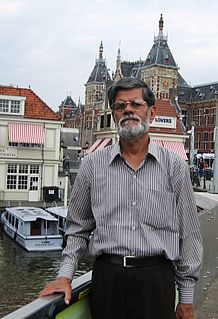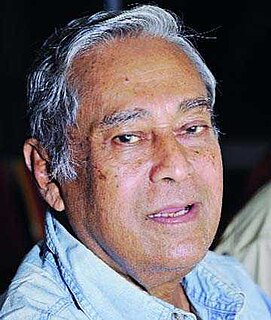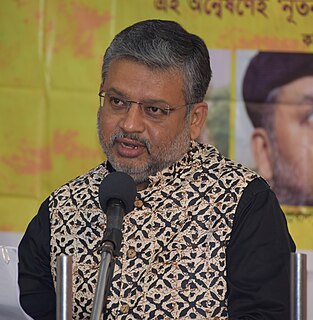
Sunil Gangopadhyay or Sunil Ganguly was an Indian poet, historian and novelist in the Bengali language based in the city of Kolkata. He is a former Sheriff of Calcutta. Gangopadhyay obtained his master's degree in Bengali from the University of Calcutta. In 1953 he and a few of his friends started a Bengali poetry magazine, Krittibas. Later he wrote for many different publications.
Jyotirmoy Datta (born 1936) is a Bengali writer, journalist, poet, and an essayist. He worked for The Statesman, Calcutta's oldest English-language daily, as feature writer, film critic, correspondent, and associate editor. He visited the University of Chicago as a lecturer, 1966–1968, and also did a residency at the University of Iowa. He has published 2 books of verse, several novels and collections of essays and short stories. Datta currently lives in Hillsborough Township, New Jersey, near New York City, where he works as an Editor for South Asia Journal. He attends many poetry readings in Manhattan and Queens and is a famous figure among the Indians and New York poets.
The Hungry Generation was a literary movement in the Bengali language launched by what is known today as the Hungryalist quartet, i.e. Binoy Majumdar, Shakti Chattopadhyay, Saileswar Ghosh, Malay Roy Choudhury, Samir Roychoudhury and Debi Roy, during the 1960s in Kolkata, India. Due to their involvement in this avant garde cultural movement, the leaders lost their jobs and were jailed by the incumbent government. They challenged contemporary ideas about literature and contributed significantly to the evolution of the language and idiom used by contemporaneous artists to express their feelings in literature and painting.

Malay Roy Choudhury is an Indian Bengali poet, playwright, short story writer, essayist and novelist who founded the Hungryalist movement in the 1960s.

Anandamela, Anondamela, or Anondomela is a children's periodical in the Bengali language published by the ABP Group from Kolkata, India.

Bengali literature denotes the body of writings in the Bengali language. Bengali has developed over the course of roughly 1,300 years. The earliest extant work in Bengali literature is the Charyapada, a collection of Buddhist mystic songs dating back to the 10th and 11th centuries, and considered to be written in an ancestor language of Bengali, Assamese, Odia and many other languages belonging to the Eastern branch of the Indo-Aryan languages. The timeline of Bengali literature is divided into three periods − ancient (650-1200), medieval (1200-1800) and modern. Medieval Bengali literature consists of various poetic genres, including Hindu religious scriptures, Islamic epics, Vaishnava texts, translations of Arabic, Persian and Sanskrit texts, and secular texts by Muslim poets. Novels were introduced in the mid-19th century. Other than the Eastern Nagari script, Bengali has been written with different scripts such as the Perso-Arabic and Sylheti Nagri in certain parts of history. Nobel Laureate Rabindranath Tagore was the best known figure of Bengali literature to the world. Kazi Nazrul Islam, notable for his activism and anti-British literature, was described as the Rebel Poet and is now recognised as the National poet of Bangladesh.
The little magazine movement originated in the 1950s and 1960s in many Indian languages like Bengali, Tamil, Marathi, Hindi, Malayalam and Gujarati, as it did in the West, in the early part of the 20th century.
Yashodhara Ray Chaudhuri is a poet residing in Kolkata, West Bengal, India. She produced collections of Bengali poetry. She was awarded the Krittibas Puraskar in 1998 by the Krittibas Patrika.
Swadesh Bharati is a Hindi poet, recipient of “Premchand Award" and "Sahitya Bhushan Award". He lives in Kolkata from where he edits Rupambara, a literary bilingual quarterly journal. He has been in active field of creative writing since more than 45 years. He is chairman of Rashtriya Hindi Academy and was guest lecturer at Madaras Christian Academy.

Desh is an esteemed Bengali language literary magazine published by the ABP Group from India on the 2nd and the 17th of every month. This magazine, which is in publication since 1933, has been edited by editors like Sagarmoy Ghosh in the past. The present editor is Suman Sengupta. After the death of Sagarmoy Ghosh, Desh started publishing non-fiction articles and essays on topics of current, historical and cultural interest. Started as a weekly, it evolved into a fortnightly in more recent years. It has also drifted from being a pure literary magazine to more current affairs-oriented format. Journalist and Ramon Magsaysay award winner Amitabha Chowdhury edited the magazine for quite some time after Sagarmoy Ghosh. Desh is published from 6 Prafulla Sarkar Street, Kolkata 700 001.

Indian Literature is an English language literary journal published bi-monthly by the Sahitya Akademi, India's National Academy of Letters. It was first launched in 1957, and is currently edited by Indian poet and writer, A.J. Thomas.

Samir Roychowdhury, one of the founding fathers of the Hungry Generation 1961–1965, was born at Panihati, West Bengal, India in a family of artists, sculptors, photographers, and musicians. His grandfather Lakshminarayan, doyen of the Sabarna Roy Choudhury clan of Uttarpara, had learned drawing and bromide-paper photography from John Lockwood Kipling, father of Rudyard Kipling, who was Curator at the Lahore Museum, and thereafter established the first mobile photography-cum-painting company in India in the mid-1880s. The company was later taken over by Samir's father Ranjit (1909–1991). Samir's mother Amita (1916–1982) was from a progressive family of 19th-century Bengal renaissance.
Subimal Basak, is an Indian fiction writer. He is a member of the Hungry generation, with Samir Roychoudhury, Falguni Roy, Shakti Chattopadhyay and the movement's creator Malay Roy Choudhury.
Falguni Roy was an anti-establishment Bengali poet born in Kolkata, West Bengal, India. Along with Shakti Chattopadhyay, Malay Roy Choudhury, Samir Roychoudhury, Subimal Basak, Debi Roy, Utpal Kumar Basu, Binoy Majumdar, Sandipan Chattopadhyay, Basudeb Dasgupta, Roy was also associated with the Hungryalist movement. Anti-establishment poet Tushar Roy was his brother.
Tridib Mitra was one of the pioneers of the Hungry generation movement in Bengali literature which changed the literary landscape of West Bengal once and for all. With his wife Alo Mitra he edited Hungry generation magazines The Waste Paper in English and Unmarga in Bengali. He and his wife were the ones who started Poetry Readings in Burning Ghats, Graveyards, Ganges river banks as well as in Country liquor joints of Kolkata. He was, in fact, one of the cultural game changers during the sixties when Hungry generation literary movement arrived with full force in the Bengali cultural arena. He and his wife were the ones who delivered Hungry generation masks of demons, jokers, gods etc. at the offices and houses of Ministers, Administrators, Newspaper Editors and other power holders of the West Bengali Establishment. He was an Anti-Establishment writer.
Debi Roy is one of the founding fathers of the Hungry generation movement in Bengali literature. He is also the first modern Dalit poet in Bengali. He was born in a very poor family and worked as an errand boy in tea stalls of Calcutta when his parents lived in a slum in Howrah. He funded his own education and became a graduate of Calcutta University. He started writing from his childhood. Debi Roy met Malay Roy Choudhury in an office of a literary periodical in 1960 and the two of them, after discussions with Shakti Chattopadhyay and Samir Roychoudhury launched the now famous Hungryalist movement in November 1961. His Howrah slum-room was the editorial office from where the Hungryalist Bulletins and Hungryalist Manifestoes were published. Along with ten other Hungryalists, Debi Roy was also arrested in 1964 on charges of obscenity in poetry though the trial court exonerated him.
Kathashilpa, of 19, Shyamacharan De Street, Calcutta 700073 was founded in 1959 by Abani Ranjan Ray (1932–2008) and friends like Indranath Majumdar. It became a rendezvous of radical intellectuals and artists of Calcutta, including those with extreme left sympathies. It stayed alive for more than thirty years and published a number of books that would later become classics in their respective fields. At present, the stewardship of the organization is in the hands of Mr. Dulal Burman, Dr. Amit Podder and Mr. Asit Poddar.

Belal Chowdhury was a Bangladeshi poet. He was awarded the Bangla Academy Literary Award in 1984, the Mazharul Islam Poetry Award in 2013 and Ekushey Padak in 2014.

Bibhas Roy Chowdhury is a Bengali poet, novelist, and essayist. He is the author of more than twenty books including five novels and numerous essays in various Bengali literary magazines. He received awards including Bangla Academy Award in 2013, Krittibas Award (1997), and Nirmal Acharya Gold Medal for poetry. Some of his poems have been translated into English by Dr. Kiriti Sengupta, a well-known poet and translator, and published by Inner Child Press in association with Hawakal Publishers (Kolkata) as Poem Continuous: Reincarnated Expression (2014). He is also one of the chief advisers of the Bengali literary magazine, Kabita Ashram, and founder member and director of a theatrical troupe named Banga Natya Charcha Kendra. He now works in a publication house.

Prabal Kumar Basu is an Indian poet, essayist and editor. He writes in his mother tongue Bengali.










